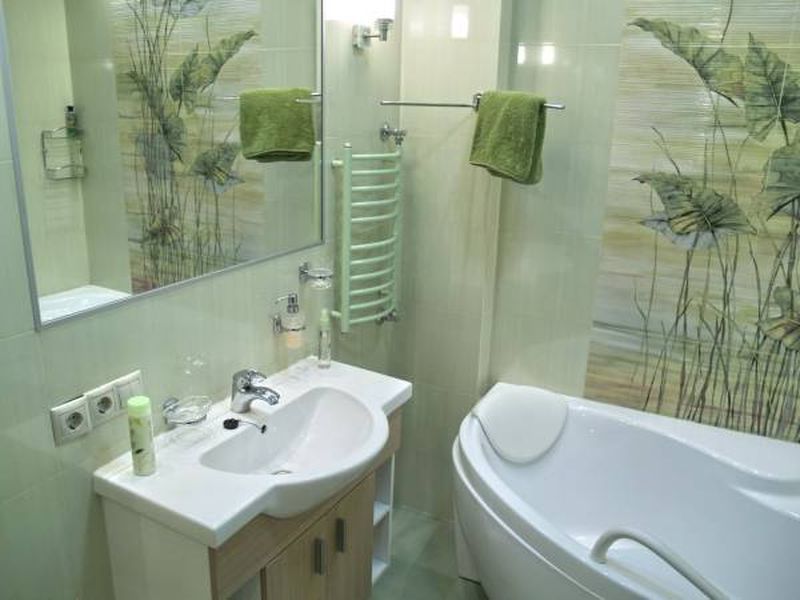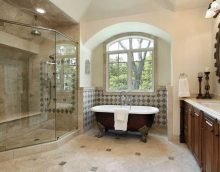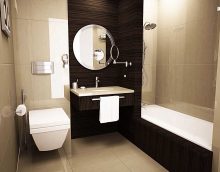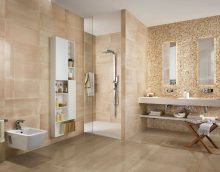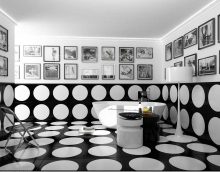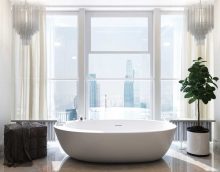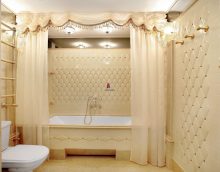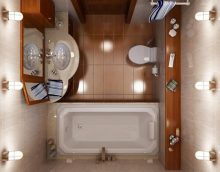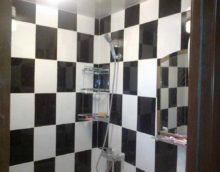Bathroom Design - Tiling
The bathroom is a place of peace and relaxation, too bright tones are inappropriate here. White tile, reminiscent of the facing of the Soviet era, is boring and trivial. Not so easy to perform spectacular the design of the bathroom is tiled, although the selection today is impressive. Tiles, porcelain tiles and ceramics are an excellent way to decorate rooms with high humidity. But it is important to choose the right material for cladding the surfaces of the floor, ceiling and walls in the bathroom or bathroom for an elegant interior.

The design of the bathroom should fully embody simplicity, sophistication, but most importantly - comfort.
Content
Spectacular design with tiled cladding available
Each has its own taste, but there are many examples when the design of bathrooms with tiled tiles impresses with their apparent simplicity, but also with impeccable aesthetics. This is obtained when everything works for a common goal.

The bathroom requires special care during repairs.
- Colour.
- Lighting.
- Design stylistics.
- Successful contrasting combinations.
- Interesting design concept.
- Harmony of textures of finishing materials.
- Fresh ideas for laying tile materials.
Specialists are following the news that appear on sale in order to track fashion trends in tiled bathtubs to embody an effective design.

For the project to succeed, it is not necessary to use expensive materials, but it is important that they are chosen with taste.
It is difficult to say for sure why in one version the patterned finish looks attractive, in the other it is replete with its inappropriate rowdy. It happens that panels or decorative inserts do not make much impression, in other bathrooms the same materials play a decisive role in the design and decoration of the bathroom.

Golden Rule. The important thing is not what the surfaces of the room are lined with, but how the decoration is in harmony.
As a background, you can use:
- Plain lining of medium and large format geometric shapes (square, rectangular, rhomboid and polygonal);
- Mosaic tiles (on a grid, convenient for finishing convex and round surfaces);
- Special tile without a facet for "seamless" laying;
- Ordinary tiles for original styling (brick, checkerboard, Christmas tree).
Tip. With a combination of colored tiles of the same size, you can get a catchy emotional design for decorating the bathroom.

The interior of the bathroom should be not only beautiful, interesting, stylish, but also resistant to various influences.
For those who like a restrained lining that resembles a natural texture, it is worth paying attention to porcelain tiles with imitation of wood or stone.
As auxiliary elements or decor use:
- Embossed side and frieze;
- Bas-reliefs and decorative inserts;
- Mosaic laying of individual walls, blocks or sections;
- Panel of broken tiles and glass;
- Mirror walls made of tiled materials;
- Glowing inserts (glass tile with diode illumination);
- Functional tile (with hooks and hangers for towels, shelves for soap dishes and shampoos).

Modern manufacturers of finishing materials provide a wide range of various materials for decorating walls.
Lovers of plain walls should diversify the bathroom decoration with colored tiles on the floor - this design will bring novelty to the classic design. Linear contrasts and mosaic rosettes on the lower plane look especially exquisite if the walls are plain or with blurry ornaments.
A weakly expressed or as if slightly emerging pattern is often offered in the form of drops, crumbs, peas, abstract strokes or plant motifs. This is a good option for those who do not accept variegation, but also considers monochromatic tiles in the bathroom boring.

You can also combine shadow transitions in one gamut or combine 2-3 close shades.
All these decorative techniques will help to create a unique interior in the bathroom without significant costs. It is also important to consider that the cold range visually makes the design of the bathroom more spacious, but less cozy.

Warm shades narrow the small room, but give a feeling of comfort.
What and how to veneer?
It may seem to an inexperienced person that it is possible to complete the entire repair and decoration of the bathroom from one batch - the design will only benefit from this. But this is a misconception, since a light tile is needed for the ceiling, only a solid one with abrasion resistance is suitable for the floor. In times of scarcity, any tiled finish was for happiness, and no one paid attention to the fact that it cracked on the floor, the surface layer of enamel was erased.

The most demanded and popular material for decorating the bathroom for more than a decade has been tile.
Today the catalogs offer:
- Wall tiles;
- Floor;
- Ceiling
- Universal;
- Auxiliary decor.
They are produced in different materials, based on traditional raw materials. It uses cement, polymers, clay with inclusions, stone chips and pigment.

Even with a limited budget, you can find what you need.
- Rectangular and square tiles with increased wear resistance are suitable for flooring. The most practical is floor porcelain, which is marked in the instructions as a footprint. Natural marble is considered the most expensive, but it gradually wipes, and due to the natural porosity it is often necessary to do hygienic processing. However, a few luxurious marble slabs in the center of the bathroom, shower or bathroom - a luxurious decoration in the design of the bathroom of any style.

The floor tiles should have a minimum coefficient of friction - a rough base is safer when they become wet on the floor after water procedures.
- The ceiling finish should be light and moisture resistant, with no tendency for condensate to accumulate, which will settle on your head. Mirror ceilings in the bathroom are beautiful, but inappropriate, they fog up from steam, the whole effect is lost. Natural porous, moisture-absorbing materials are also not recommended. Although they "breathe" absorbing and giving away moisture, mold and fungus start up from the excess in the pores of sandstone and shell rock, especially with poor ventilation.

In the bathroom, the optimum temperature should be maintained.
- Tile wall decoration in rooms for sanitary procedures should be aesthetic, especially at eye level, and practical. Walls are often washed and cleaned with household chemicals, often with abrasive particles, to remove plaque from calcium and rust.

High-quality facing guarantees long-term operation.
- Some other surfaces also prefer to finish with tiled materials, including curved surfaces. For this, a fine mosaic (on a grid and with separate elements) is successfully used. It is convenient for columns of arched vaults, sunbeds and sides that hide the tubes. Mosaic patterns of small fragments are also used for facing smooth surfaces.

You can trim the countertop under the sinks, pedestals or decorative panels under the bathroom.
Attention! When buying building materials, check the marking and color - all tiles for cladding should be from one batch, so that there are no differences, it is difficult to buy the exact same one. The pictograms on the packaging or in the instructions clearly show the main parameters of the tiled materials. Learning to read them.
Methods of decorative tile laying
The interior design of a small bathroom or a spacious bathroom depends not only on the choice of tile materials, but also on how they were laid out.

The tile does not cause allergic reactions, not toxic.
| 1. | Seam to seam | Match seams vertically and horizontally |
| 2. | Diamond-shaped | Squares are laid diagonally |
| 3. | Diagonally | A rectangular tile is laid along an imaginary bisector of a right angle |
| 4. | Chess board | Used for laying square tiles in a contrasting color. |
| 5. | Brick | A rectangular tile is laid horizontally, alternating seams |
| 6. | Herringbone | Effective laying of rectangular tiles, alternating diagonal rows from left to right |
| 7. | Modular styling | The pattern alternates tiles of different sizes in a ratio of 1: 2 (square, rectangle) |
| 8. | Patterned | Tiles with a pattern in ¼ - a beautiful ornament is formed when laying |
| 9. | Patchwork | Used colored tiles with different patterns or suitable shades |
| 10. | Custom styling | Materials of different formats and colors form a spectacular patterned canvas |
Lining the walls (and other surfaces in the bathroom) is done as:
- Continuous coating;
- Partial (combined with painting, plastering or finishing with plastic panels);
- Fragmented tiling (wall or part of the wall).
The choice of bathroom coverage depends on its size and design.

Tile is a completely environmentally friendly material, so the environment is not polluted during its production.
Varieties of Bathroom Tiles
Most know two varieties - ceramic tiles and tiles, but experts identify much more materials used for bathrooms.

Thanks to the obligatory firing procedure, all potential allergens and toxins are destroyed, therefore, even with prolonged contact, there are no and cannot be any unforeseen reactions of the body.
According to the type of feedstock and production technology, the following varieties are distinguished:
- Monocottura (the same tile) is affordable, but not very durable high-density tile with a protective layer and often with a pattern;
- Bikotura - enameled double fired tile;
- Monoporosis - based on white clay, an intermediate position between the above species;
- Metlakh tiles - of various shapes, small format, for patterned masonry;
- Cotto - a specific cladding (with a natural shade of clay), applicable for country style;
- Clinker - strong ceramic with improved properties; it is used for facades;
- Porcelain stoneware is a particularly durable flooring material with abrasion resistance;
- Majolica - a type of ceramic, material close to faience;
- Earthenware (with a special way of drawing a picture);
- Porcelain - an elite finish;
- Glass tile - an innovative finish, used for ordinary finishes and luminous blocks;
- Mirror tiles - for bathrooms needed with a moisture resistant coating;
- Decorative inserts and panels, plinth, side and border.

With high-quality manufacturing and proper installation, tiles will last for more than a decade.
Such a variety of offers makes it possible to move away from the traditional white tiling and find an option to embody the design of the bath of your dreams.
Mosaic rolls are very convenient for facing convex and concave surfaces. They do not require complex styling - the grater with squares is simply recessed into the solution, the excess is removed. Pros do not always use grouting.This is the easiest way of facing, reminiscent of wallpaper, but they are placed not only vertically, but also horizontally - under the plumb line and level.

The probability of multiplication of fungi and bacteria in the bathroom with lined tiles is lower than with other materials.
Under glass squares with faces, you can lay a reaped foil, then under a ray of light the wall will play with glare, like precious stones. True, such an “expensive” design looks cold, especially in blue tones.
There is also a tile with photo printing or print. Particularly spectacular look panels with a 3D effect, as in the photo, visually expanding the space.

3D tiles, forming whole panels and paintings throughout the wall, will become a real decoration of your home.
The choice of finishes for a small bathroom
The design of the bathrooms with tiling is not particularly limited, but it is important that there is no sensation of narrowing of the walls or overhanging ceiling. This happens when the black floor and ceiling with light or mirror walls.

The high strength of the ceramic tile allows it to withstand high pressure and weight.
The color and format of the tile is of secondary importance, especially if it is without chamfer, the combination is important - there should be more light surfaces in proportion.
Imitation of marble with "seamless" laying, successfully combined with plain light surfaces, visually expands the space of a small bathtub or bathroom.
Large patterns can visually narrow the size of a small room, it is better to limit yourself to individual inserts.

Combinations of two or three types of ceramic tiles look great.
Horizontal and vertical lines “raising” the ceiling and sliding walls work flawlessly. If the black color seems bleak, use an alternative:
- Violet;
- Navy blue;
- Eggplant;
- Blueberry tint.
The classic black and white design is not for everyone. But the extravagant version with a black sanitary ware and golden shades on the curb against a light background always looks great, especially with imitation of marble on the floor.

It is not necessary to use only one type of tile to create a bathroom design.
DIY Tile Laying Tips
Although independent tiling is troublesome, many prefer to do this for the sake of economy. It is difficult only the first time, then it will be easier. It is better to stock 10% more material, this will eliminate defects due to rejection, broken tiles and unsuccessful cutting. If it turned out to be less than expected, leave a place in the center of the walls and floor - for decorative inserts or mosaic sockets. A beautiful Spanish or Italian tile is suitable there - the rest of the collections are given 10-40% cheaper.

The main thing is not to make a mistake in calculating how much bathroom tiles are needed.
Tile materials are placed on a special glue or cement mortar. The surface must be prepared, otherwise something will fall away from the convex walls. The solution is worked out with a special spatula with teeth so that air gaps remain.
The easiest way is to lay a “seamless” tile, the dimensions of which are precisely adjusted. It is expensive, but save plastic crosses and grout (you can’t do without a minimum amount). Sometimes it is replaced with a colorless construction sealant or silicone.
Attention! For beginners, cutting tiles is difficult. Do not even try to “crumble” porcelain tiles with ordinary tile cutters and wire cutters - this is dangerous. To do this, you need a waterjet cutting machine - use the services of specialized companies.

Currently, the range of tiles for facing bathroom surfaces is incredibly wide.
When cutting materials with a grinder or tile cutter, do not forget about eye protection and work clothing. Do not want to engage in slicing - choose a facing of a format that will completely fit into the length of the walls and floor. Missing centimeters can be blocked with an end corner, a plinth or a side. Stacking starts from the bottom.Use the tile laying workshop if you have questions.
VIDEO: How to choose a tile for a bathroom.


















































